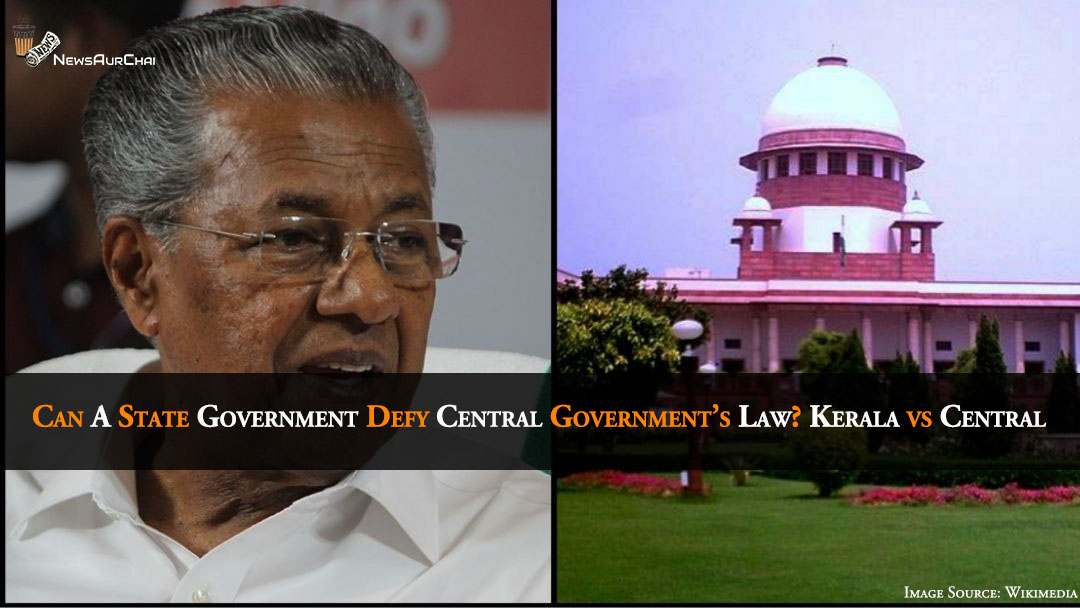Can A State Government Defy Central Government’s Law? Kerala vs Central

Kerala, the most politically aware state of India, has made a move against the Central Government’s Citizenship Amendment Act (CAA). The Pinarayi Vijayan-led LDF Government in Kerala has filed a suit in the Supreme Court against the Act under Article 131. The Government has been vocal against the Act ever since it was passed on December 11, 2019, along with other State Governments who have also protested against the Act. However, by filing the case in the Supreme Court, Kerala becomes the first state to oppose the Centre’s law legally.
Kerala assembly had also passed a ant- CAA resolution on December 31, 2019, for the Central Government to repeal CAA. The Chief Minister has termed the Act to be against the fundamental rights set by the Constitution and believes that the law challenges the principles of Secularism, Freedom, and Equality, negating the idea of ‘Unity in Diversity’. In this regard, the CM’s viewpoint is clear, “The amendment amounts to a division based on religion and has created a wrong picture about our country at the international level.
The Citizenship Amendment Act has created apprehensions among Non-Resident Keralites as well. It is under these circumstances that the resolution was moved for discussion”. The opposition party, Congress-led UDF, also supported the resolution.
Following this resolution, CM Vijayan on January 3, 2020, wrote to the Chief Ministers of 11 States opposing the CAA, including Mamata Banerjee and Arvind Kejriwal, emphasising on the necessity to safeguard secularism and democracy.
Kerala’s suit against the Central law is the fifth instance of a case under Article 131. The Article 131 in simple terms states that if any dispute arises between the States of India or between the State Government and the Central Government, then it is the jurisdiction of the Supreme Court to resolve these matters under Article 131. Kerala has a stringent standpoint—that the law violates Articles 14 (Equality before law), 21 (Right to life and personal liberty) and 25 (Freedom of conscience and free profession, practise, and propagation of religion).
Previous instances of such move include: State of West Bengal vs Union of India (1963), State of Karnataka vs Union of India (1977), State of Madhya Pradesh vs Union of India (2011), and the State of Jharkhand vs State of Bihar (2015). Kerala’s suit also challenges the Passport (Entry to India) Amendment Rules 2015, and Foreigners (Amendment) Order 2015, regarding them as ultra vires (beyond Centre’s authority) and should be declared void.
This move of Kerala has given rise to a very apt question—can a State Government defy the Central Government’s law? A hint to the answer lies in the similar precedent case of Madhya Pradesh vs Union of India (2011). The two-judge bench of Justice P. Sathasivam and Dr B.S. Chauhan had not entertained the plaintiff’s plea observing that central law can’t be challenged under Article 131: “It follows that when the Central laws can be challenged in the State High Courts as well and also before this Court under Art.32. Normally, no recourse can be permitted to challenge the validity of a Central law under the exclusive original jurisdiction of this Court provided under Article 131.” This was the first time a central law was challenged on the ground of infringement of a fundamental right (Live Law).
A second instance can also be noted in the case of State of Jharkhand vs State of Bihar where the Supreme Court took the opposite view in 2015 and referred the question of law to be ascertained by a larger bench of the Supreme Court.
Under Article 256, the States have to comply with Parliamentary laws, including the CAA, which Kerala government recognises to be “manifestly arbitrary, unreasonable, irrational and violative of fundamental rights”. As per reports, the petitioners, from all walks of life across the country, have argued that the law welcomes “illegal migrants” into India selectively based on their religion and pointedly exclude Muslims. They have contended that the CAA shares an “unholy nexus” with the National Register of Citizens (NRC) and is against principles of secularism, right to equality and dignity of life enshrined in the Basic Structure of the Constitution.” The CAA has invited controversies and protest movements from all over the nation. In the light of the rarity of the situation, maybe Kerala’s action can be termed as justified.
Kerala government‘s petition notes states, While the Impugned Amendment Act covers the Hindus from Pakistan, Afghanistan and Bangladesh, the defendant did not consider the issues of the Hindus, primarily of Tamil descend, in Sri Lanka and Hindu Madhesis in Terai of Nepal, whose ancestors migrated to Sri Lanka and Nepal respectively in the eighteenth Century from the then British India. According to reports, “CAA covers certain religious minorities of Pakistan, Bangladesh and Afghanistan and neglect other reportedly persecuted religious minorities and sects such as Ahmaddiyas, Shias and Hazaras.” The streets of Kochi and Kozhikode have witnessed the inhabitants coming out to raise their voices against the Act.
Union Law Minister, Ravi Shankar Prasad had slammed the Kerala Government after it had passed the resolution against CAA. Kerala’s Governor Arif Mohammad Khan had also stated that Kerala state assembly’s resolution was “illegal” and “unconstitutional”.
The final hearing of the Supreme Court is scheduled on January 22, 2020, in which around 60 petitions by individuals and political parties are expected to be heard. The verdict of apex court may ultimately put rest to the bifurcated state of the nation due to the controversial law.





